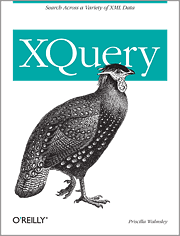Description
The functx:atomic-type function checks the types of one or more atomic values and returns their type names. It will only work for built-in atomic types; if the value has a user-defined atomic type, the function will return the built-in type upon which the user-defined type is based. If $values is the empty sequence, it will return "empty sequence".
Arguments and Return Type| Name | Type | Description |
|---|
$values |
xs:anyAtomicType* |
the value(s) whose type you want to determine |
| return value |
xs:string* |
XQuery Function Declaration| See XSLT definition. | declare namespace functx = "http://www.functx.com";
declare function functx:atomic-type
( $values as xs:anyAtomicType* ) as xs:string* {
for $val in $values
return
(if ($val instance of xs:untypedAtomic) then 'xs:untypedAtomic'
else if ($val instance of xs:anyURI) then 'xs:anyURI'
else if ($val instance of xs:ENTITY) then 'xs:ENTITY'
else if ($val instance of xs:ID) then 'xs:ID'
else if ($val instance of xs:NMTOKEN) then 'xs:NMTOKEN'
else if ($val instance of xs:language) then 'xs:language'
else if ($val instance of xs:NCName) then 'xs:NCName'
else if ($val instance of xs:Name) then 'xs:Name'
else if ($val instance of xs:token) then 'xs:token'
else if ($val instance of xs:normalizedString)
then 'xs:normalizedString'
else if ($val instance of xs:string) then 'xs:string'
else if ($val instance of xs:QName) then 'xs:QName'
else if ($val instance of xs:boolean) then 'xs:boolean'
else if ($val instance of xs:base64Binary) then 'xs:base64Binary'
else if ($val instance of xs:hexBinary) then 'xs:hexBinary'
else if ($val instance of xs:byte) then 'xs:byte'
else if ($val instance of xs:short) then 'xs:short'
else if ($val instance of xs:int) then 'xs:int'
else if ($val instance of xs:long) then 'xs:long'
else if ($val instance of xs:unsignedByte) then 'xs:unsignedByte'
else if ($val instance of xs:unsignedShort) then 'xs:unsignedShort'
else if ($val instance of xs:unsignedInt) then 'xs:unsignedInt'
else if ($val instance of xs:unsignedLong) then 'xs:unsignedLong'
else if ($val instance of xs:positiveInteger)
then 'xs:positiveInteger'
else if ($val instance of xs:nonNegativeInteger)
then 'xs:nonNegativeInteger'
else if ($val instance of xs:negativeInteger)
then 'xs:negativeInteger'
else if ($val instance of xs:nonPositiveInteger)
then 'xs:nonPositiveInteger'
else if ($val instance of xs:integer) then 'xs:integer'
else if ($val instance of xs:decimal) then 'xs:decimal'
else if ($val instance of xs:float) then 'xs:float'
else if ($val instance of xs:double) then 'xs:double'
else if ($val instance of xs:date) then 'xs:date'
else if ($val instance of xs:time) then 'xs:time'
else if ($val instance of xs:dateTime) then 'xs:dateTime'
else if ($val instance of xs:dayTimeDuration)
then 'xs:dayTimeDuration'
else if ($val instance of xs:yearMonthDuration)
then 'xs:yearMonthDuration'
else if ($val instance of xs:duration) then 'xs:duration'
else if ($val instance of xs:gMonth) then 'xs:gMonth'
else if ($val instance of xs:gYear) then 'xs:gYear'
else if ($val instance of xs:gYearMonth) then 'xs:gYearMonth'
else if ($val instance of xs:gDay) then 'xs:gDay'
else if ($val instance of xs:gMonthDay) then 'xs:gMonthDay'
else 'unknown')
} ; |
Examples| XQuery Example | Results |
|---|
functx:atomic-type(2) |
xs:integer |
functx:atomic-type('abc') |
xs:string |
functx:atomic-type(xs:date('2005-12-15')) |
xs:date |
functx:atomic-type(
(2,'abc',xs:date('2005-12-15'))) |
('xs:integer',
'xs:string',
'xs:date') |
History |
Recommended Reading: 
|

